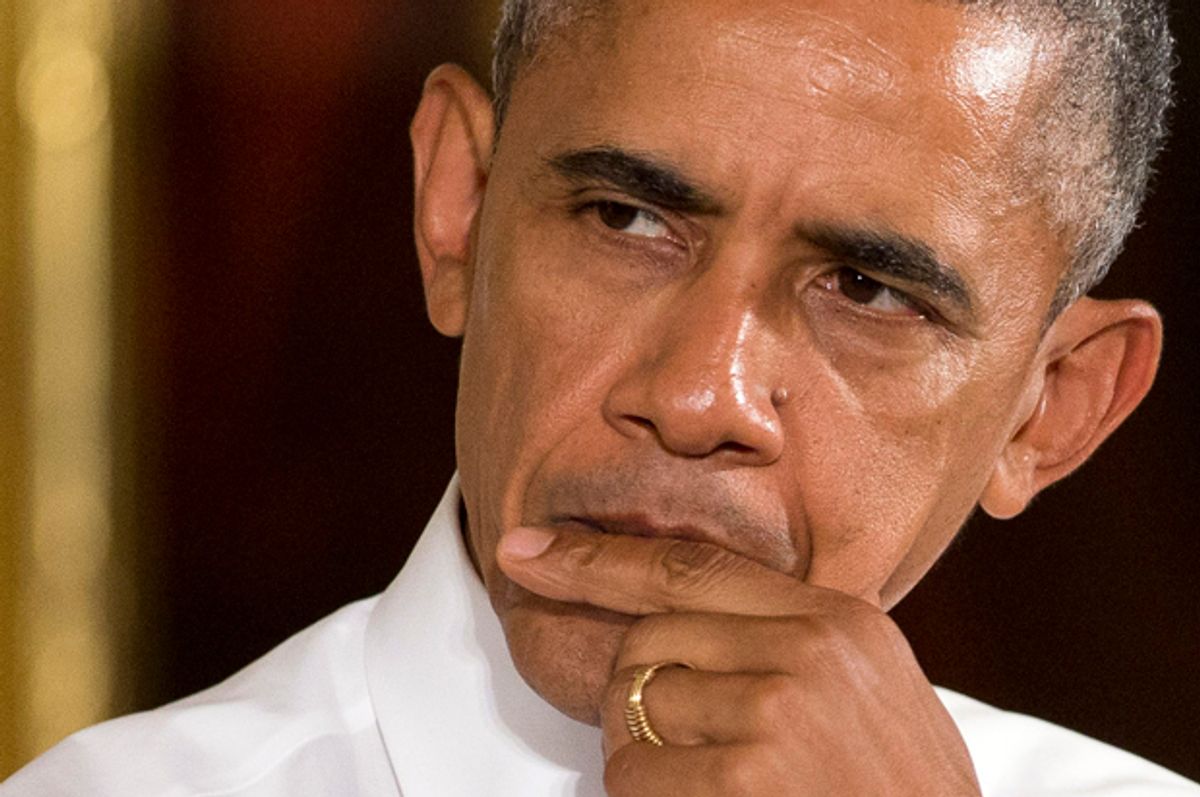The Obama administration’s response to the Paris terrorist attacks has provided an opening for pundits to indulge in one of their favorite pastimes: overwrought complaints about President Obama’s leadership and “tone.” National Journal’s Ron Fournier, the chief “leadership” fetishist of the Beltway press, wrote a terribly earnest column in which he sadly, solemnly declared that the Paris attacks proved once and for all that Ron Fournier is right and Obama can’t lead. A similar take was offered by the New York Times’ Frank Bruni, who complained: “From Obama we needed fire. Instead we got embers, along with the un-presidential portrayal of Republicans as sniveling wimps whose fears about refugees were akin to their complaints about tough debate questions.” The idea that Obama is “detached” from the terrorism debate was a key part of Josh Kraushaar’s column arguing that 2016 is shaping up to be a “landslide” election for the GOP.
Much of this is just theater criticism. The politics of terrorism and national security in the post-9/11 era still put a premium on tough-guy chest thumping. People like Chris Christie are widely presumed to be strong leaders on national security because Christie goes on TV and barks about how when he’s president, all of the country’s adversaries will be cowed by his potent manliness. Obama doesn’t do that kind of stuff, and he never has, and so commentators – with an unsubtle assist from Republican and conservative messaging efforts – argue that he’s weak and feckless.
This is frustrating because it also gives a pass to people who go out there and overreact to terrorist threats and get way ahead of what is actually happening in the world. Marco Rubio’s response to the Paris attacks was to cut an ad warning that the same thing could happen here because we are in a “civilizational struggle” with ISIS. That’s complete foolishness that vastly overstates the power and reach of the Islamic State, and it actually feeds into the terrorist group’s preferred narrative of an apocalyptic confrontation between Islam and the West. But he sounds so very serious and he’s promising to take strong action, so no one points out that he’s detached from reality.
Complaints about his lack of “leadership” notwithstanding, I actually think Obama is providing a valuable service in modulating his response and not succumbing to the alarmist temptation. At yesterday’s press conference with French President François Hollande, Obama delivered an extended opening statement that contained a powerful and important message: Don’t freak out about terrorism.
“It’s not just our security professionals who will defeat ISIL and other terrorist groups,” Obama said. “As Americans, we all have a role to play in how we respond to threats. Groups like ISIL cannot defeat us on the battlefield, so they try to terrorize us at home – against soft targets, against civilians, against innocent people. Even as we’re vigilant, we cannot, and we will not, succumb to fear. Nor can we allow fear to divide us – for that’s how terrorists win. We cannot give them the victory of changing how we go about living our lives.”
A message like this is a lot more useful than forced bipartisan comity and accommodating nods to people who make it their business to stoke panic over terrorism. This is actually empowering and accomplishes something beyond keeping people worried about the next attack. And it treats terrorism for what it is: an act of spectacular violence intended to impel us to change our behavior. They want us to overreact, so don’t give them what they want.
This is a necessary contrast to the behavior we’ve been seeing from Republican congressmen and GOP presidential candidates, who are treating the Islamic State as an imminent and existential threat to the country and tailoring their policy ideas in ways that maximize panic over terrorism. This ugly business over Syrian refugees is the best example of that, and Obama’s mockery of the politically motivated Republican exploitation of the issue was completely warranted. Whining that it didn’t adhere to some ill-defined standard of “presidential” behavior accomplishes nothing beyond distracting attention from people who are unsubtly trying to prey on public misconceptions about Muslims and terrorism.
There also seems to be some general agreement that the president now needs to do "something" to change his approach to fighting the Islamic State in Iraq and Syria, though there's no firm consensus on what that "something" should be. I’m no fan of the Obama administration’s strategy for dealing with ISIS and I’ve been endlessly frustrated by the incremental mission creep that seems to have taken hold. But I’d much rather that the Obama administration adopt a cautious and considered posture post-Paris than indulge public anxiety and get even further ahead of itself in promising what can be accomplished with its existing strategy.



Shares